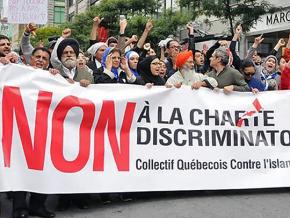The only option for the Quebec left
The Islamophobia of the right wing in Quebec will come to center state in April when Premier François Legault and his party, Coalition Avenir Québec (CAQ), which holds the majority in Quebec’s National Assembly, will push for a vote on legislation to widen a ban on the wearing of religious symbols to include all public employees, including teachers. The National Assembly passed a similar ban known as Bill 62 in October 2017, but last year, the Quebec Superior Court suspended the law’s provisions against Muslim women who wear a niqab or burqa. Now, the right-wing CAQ wants to push through legislation to be voted on in Québec’s National Assembly.
The left-wing party Québec Solidaire (QS) was the only party in the Assembly to criticize Bill 62 for restricting the rights of Muslim women, but there are significant debates within the organization. In March, QS will hold a National Council, where delegates will choose between Option A, a supposed “compromise framework” which would accept a ban on public workers who are in a position to exercise “coercive authority” — and Option B, which would oppose a ban outright. QS’s left wing is mobilizing around a campaign to win Option B. In this article published at Presse-toi à gauche, makes the case that QS must stand against Islamophobia and choose Option B. This article was translated by Michele Hehn.
DURING THE National Council in March, two options will be proposed to Québec Solidaire’s (QS) delegates: Option A, which would forbid certain professions from wearing religious garb; and Option B, which proposes no restrictions on the wearing of religious garb.
Having our proposals denounced as unpragmatic (in other words, unrealistic). Slandering our positions as extremist. These are the kinds of attacks against Québec Solidaire we are used to finding in the pages of the Journal of Montreal, for example.

It is therefore a little surprising, and even regrettable, to hear QS’s own members, such as Pierre Mouterde or Ruba Ghazal, make these same kinds of attacks against a proposal coming from their own party.
Firstly, let’s recall: Option B is basically for maintaining things as they currently are, without any special restrictions on religious garb. Are we living today in Québec an “extreme situation” with respect to religious symbols? Is there even a real, concrete problem that the restrictions could resolve?
If this were the case, those in favor of restrictions would not need to resort to continual appeals to all kinds of hypotheticals, imaginary situations and purely theoretical considerations to justify their position.
Let’s begin by discarding the position put forward by the “secularism collective,” which supports wall-to-wall restrictions in the public sector: It does not respect our program and will therefore not be included in the options proposed by the delegates in late March.
IF WE take a political look at the issue, it is clear that option B is the winning and strategic choice for Québec Solidaire.
First of all, it is easy to see that the lists of professions about which restrictions could apply are endless. To those already targeted by Option A, our opponents will add first teachers, then daycare employees and then school principals.
Choosing Option A hands them a pedestal to keep restricting. Voting in Option A will therefore “solve” nothing at all. Quite the contrary, it will legitimize the very existence of restrictions of this kind. And the demagogues will revel in political gains while we strain to explain the subtle nuances between “coercive power” and “position of authority.”
In addition, it has been clear from the beginning just what a legislative and regulatory quagmire the Coalition Avenir Québec has dug itself into over this matter. We have nothing to gain from this unfolding political debacle.
Let’s recall that we won nothing concrete in 2013 by adopting the list of Bouchard-Taylor restrictions, which shows the weakness in the poll-based argument that we will appeal to a “majority” in adopting Option A. Moreover, this “majority” falls apart quickly once we take the youth into account or as soon as we speak of placing limitations on the Charter of Rights and Freedoms.
Finally, in these kinds of debates, the system goes awry, and the final targets become the Muslim women in Quebec who wear the veil. However, our principles clearly establish that the struggle against racism is a priority for the party. We have acknowledged that systemic racism exists, and we supported the creation of a commission to look into this phenomena.
Far from being a “moralizing position,” antiracism is a real, political struggle for Québec Solidaire, in the same way as the feminist and LGBT struggle.
This struggle plays a vital role in bringing together the united and diverse people’s coalition, which is the only thing capable of challenging neoliberalism’s tenacious grip on our society. To get there, we must break with our opponents in a straightforward and unequivocal manner.
Only Option B will allow us to position ourselves clearly as defenders of the true “shared values” of our society — those which represent our principles: feminism, pluralism, openness and equality of all. Let’s not miss this opportunity!


